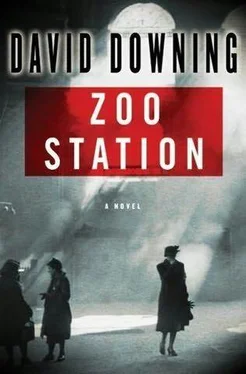David Downing - Zero Station
Здесь есть возможность читать онлайн «David Downing - Zero Station» весь текст электронной книги совершенно бесплатно (целиком полную версию без сокращений). В некоторых случаях можно слушать аудио, скачать через торрент в формате fb2 и присутствует краткое содержание. Жанр: Шпионский детектив, на английском языке. Описание произведения, (предисловие) а так же отзывы посетителей доступны на портале библиотеки ЛибКат.
- Название:Zero Station
- Автор:
- Жанр:
- Год:неизвестен
- ISBN:нет данных
- Рейтинг книги:5 / 5. Голосов: 1
-
Избранное:Добавить в избранное
- Отзывы:
-
Ваша оценка:
- 100
- 1
- 2
- 3
- 4
- 5
Zero Station: краткое содержание, описание и аннотация
Предлагаем к чтению аннотацию, описание, краткое содержание или предисловие (зависит от того, что написал сам автор книги «Zero Station»). Если вы не нашли необходимую информацию о книге — напишите в комментариях, мы постараемся отыскать её.
Zero Station — читать онлайн бесплатно полную книгу (весь текст) целиком
Ниже представлен текст книги, разбитый по страницам. Система сохранения места последней прочитанной страницы, позволяет с удобством читать онлайн бесплатно книгу «Zero Station», без необходимости каждый раз заново искать на чём Вы остановились. Поставьте закладку, и сможете в любой момент перейти на страницу, на которой закончили чтение.
Интервал:
Закладка:
After a quick lunch with Effi in the Uhlandeck Cafй he set off for Kiel. The Berlin-Hamburg autobahn was still under construction, which left him with the old road through Schwerin and Lubeck, around 350 kilometers of two-lane highway across the barely undulating landscape of the North German plain. After three hours of this he began to wonder whether the train would have been better. The car had seemed a safer bet, but only, he realized, because he had fallen for the juvenile notion that it made escape seem more feasible. In reality, he had about as much chance of outrunning the Gestapo in the Hanomag as an Aryan sprinter had of outrunning Jesse Owens.
He arrived in Kiel soon after dark, stopped at the railway station to buy a town guide at one of the kiosks, and studied it over a beer in the station buffet. Kiel itself stretched north along the western shore of a widening bay which eventually opened into the Baltic. Gaarden was on the other side of the bay, accessible by steam ferry or a tram ride around its southern end.
Russell decided to look for a hotel near the station-nothing too posh, nothing too seedy, and full of single businessmen leading relatively innocent lives. The Europдischer Hof, on the road which ran alongside the station, met the first two requirements, and on a busy day might have met the third. As it was, several lines of hopeful keys suggested the hotel was half empty, and when Russell asked for a room the receptionist seemed almost bemused by the scope for choice. They settled on a second floor room at the front, which looked out across the glass roof of the station, and the seagull colony which had been founded on it.
The hotel restaurant showed no signs of opening, so Russell walked north down the impressive Holstenstrasse and found an establishment with a decent selection of seafood. After eating he walked east in the general direction of the harbor, and found himself at the embarkation point for the Gaarden ferry. The ferry itself had left a few seconds earlier and was churning across the dark waters toward the line of lights on the far side, some half a kilometer away. Looking left, up the rapidly widening bay, Russell could see what looked like a large warship anchored in midstream.
He stood there for several minutes enjoying the view, until the icy wind became too much for his coat to cope with. Back at the hotel he had a nightcap in an otherwise deserted bar, went to bed, and fell asleep with surprising ease.
He woke early, though, and found that the Europдischer Hof considered breakfast an unnecessary luxury. There were, however, plenty of workingmen’s cafйs selling hot rolls and coffee around the station. By eight he was driving through the town center, heading for the northern suburb of Wik, where the main harbor for merchant ships was situated. He had already finished his article on German sailors, but the Gestapo weren’t to know that, and he needed an honest reason for being in Kiel. Over the next couple of hours he talked to sailors in the cafйs on the Wik waterfront, before moving on to the eastern end of the Kiel Canal, which lay just beyond. There he watched a Swedish freighter pass through the double locks which protected the canal from tidal changes, chatting all the while with an old man who used to work there, and who still came to watch. Driving back along the western shore of the haven Russell got a better view of the warship he’d seen the night before. It was the recently commissioned Scharnhorst, and its guns were lowered toward the deck, as if apologizing for their existence. Two U-boats were tied up alongside.
He wasn’t hungry but had lunch anyway, along with a couple of beers to calm his nerves, before following the tracks of the Wellingdorf tram through Gaarden. The Germania Bar wasn’t hard to spot-as Gert had said, it was almost opposite the main gate of the Deutsch Werke shipyard-and there was no shortage of places to leave the car. The bar itself was on the ground floor of a four-storey building, and seemed remarkably quiet for a lunch hour. He drove another few hundred meters toward Wellingdorf before turning and retracing the route back to Kiel.
With Paul’s birthday in mind, he spent the rest of the afternoon looking round the shops in the town center. The two toy emporiums he found were uninspiring, and he’d almost given up when he came across a small nautical shop in one of the narrower side streets. Pride of place in the window display had been given to a model of the Preussen which, as Paul had once told him, was the only sailing ship ever built with square sails on five masts. The price made him wince, but the model, on closer inspection, looked even better than it had in the window. Paul would love it.
Russell carefully carried the glass case back to the car, did his best to immobilize it in the back, and covered it with the small rug he’d bought for Effi’s use on Rьgen Island. He checked his watch-another five hours until his appointment at the Germania Bar-and went back to the Europдischer Hof, hoping to wile the time away with a nap. Despite the unexpected bonus of a hot bath, he found sleep impossible, and just lay on the bed watching the room grow darker. Around five o’clock he turned on the lights and expanded the notes he’d made that morning.
At seven he walked across to the station for something to eat and another beer, eschewing a second with some difficulty. The concourse was full of boisterous sailors in Scharnhorst caps, presumably going on leave.
Back at the hotel, he collected his suitcase, handed in his key, and walked out to the Hanomag. As he headed for Gaarden the road seemed empty, but Gaarden itself was getting ready for Friday night, the open doorways of numerous bars and restaurants spilling light across the cobbled street and tramlines. There were a lot of sailors in evidence, a lot of women awaiting their pleasure, but no sign of the police.
He parked up against the shipyard wall and sat for a minute, examining the Germania Bar. Conversation and laughter drifted out through the open door, along with a smell of fried onions. Light edged the closed curtains in all but one of the upstairs windows; in the darkened exception a man could be seen leaning out, a cigarette bobbing between his lips. It was a brothel, Russell realized. And it was three minutes to eight.
Heart in mouth, he climbed out of the Hanomag, checked it was locked, and waited for a tram to pass before crossing the road. The bar was bigger inside than the outside suggested, with two walls of booths, a few tables and a small area for dancing should anyone feel the need. It was plusher than he’d expected, and cleaner. The booths were bound in leather, the bar itself highly polished. There were several young sailors to be seen, but most of the men, like Russell, were either entering or enjoying middle age inside their respectable overcoats. He took his off, seated himself in one of the two remaining empty booths, and laid Martin Chuzzlewit face up on the table.
“Good book?” the waitress asked him. “Chuzzlewit,” she said with a laugh, “what sort of name is that?”
“English,” he told her.
“That explains it. What would you like?”
He ordered a Goldwasser, and looked around the room. A few faces had looked his way when he entered, but no one had shown any obvious interest since. One of the sailors stood up, playfully pulled his female companion to her feet, and headed for a door in the back wall. As it opened, the bottom of a staircase came into view.
The Goldwasser arrived, and a female companion shortly thereafter. She was about his age, thin verging on scrawny, with dark-circled eyes and a tired smile. “Buy me a drink, Herr Russell,” she suggested in a low voice, before he could say he was waiting for someone else. She leaned across the table, put a hand over his, and whispered: “After we’ve had a drink we’ll go upstairs, and you’ll get what you came for.”
Читать дальшеИнтервал:
Закладка:
Похожие книги на «Zero Station»
Представляем Вашему вниманию похожие книги на «Zero Station» списком для выбора. Мы отобрали схожую по названию и смыслу литературу в надежде предоставить читателям больше вариантов отыскать новые, интересные, ещё непрочитанные произведения.
Обсуждение, отзывы о книге «Zero Station» и просто собственные мнения читателей. Оставьте ваши комментарии, напишите, что Вы думаете о произведении, его смысле или главных героях. Укажите что конкретно понравилось, а что нет, и почему Вы так считаете.












